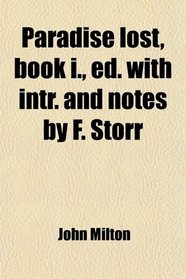Search -
Paradise lost, book i., ed. with intr. and notes by F. Storr
Paradise lost book i ed with intr and notes by F Storr
Author:
Purchase of this book includes free trial access to www.million-books.com where you can read more than a million books for free. This is an OCR edition with typos. Excerpt from book: NOTES 1-26 An invocation of the Holy Spirit for his aid in the great work the poet is essaying; viz., the account of man's disobedience, and the consequent lo... more »
Author:
Purchase of this book includes free trial access to www.million-books.com where you can read more than a million books for free. This is an OCR edition with typos. Excerpt from book: NOTES 1-26 An invocation of the Holy Spirit for his aid in the great work the poet is essaying; viz., the account of man's disobedience, and the consequent lo... more »
ISBN-13: 9781458838551
ISBN-10: 1458838552
Publication Date: 8/1/2009
Pages: 66
Rating: ?
ISBN-10: 1458838552
Publication Date: 8/1/2009
Pages: 66
Rating: ?
0 stars, based on 0 rating




